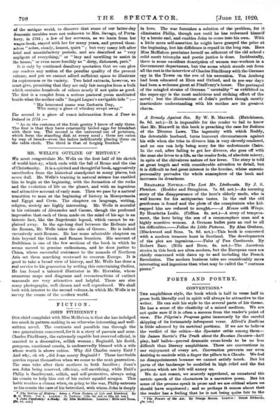MR. WELLS'S OUTLII\TE OF HISTORY.*
We must congratulate Mr. Wells on the first half of his sketch of world-histcry, which ends with the fall of Rome and the rise of Christianity. It is a spirited and thoughtful book, aggressively unorthodox from the historical standpoint in many places, but never dull. Mr. Wells's training in natural science has enabled him to begin at the beginning, with the formation of the rocks and the evolution of life on the planet, and with an ingenious and attractive account of early man. Then we pass by a natural transition to man at the beginning of history in Mesopotamia and Egypt and Crete. The chapters on language, writing, religion, society are highly interesting. Mr. Wells is scornful in his estimate of Alexander and Caesar, though the profound Impression that each of them made on the mind of his age is an historic fact, like the Napoleonic legend, which cannot be ex- plained away. In the age-long duel between the Hellenic) and the Roman, Mr. Wells takes the side of Greece. He is indeed excessively anti-Roman. He has some admirable chapters on Asia beyond the Greek and Roman frontiers. His account of Buddhism is one of the few sections of the book in which he seems moved to genuine enthusiasm, and he does justice to China, whose successful resistance to the nomads of Northern Asia set them marching westward to overrun Europe. It is good to take a broad view of history, and Mr. Wells has done a real service to his generation by writing this entertaining Outline. He has found a talented illustrator in Mr. Horrabin, whose numerous maps and diagrams and reconstructions of extinct mammals are very attractive and helpful. There are also many photographs, well chosen and well reproduced. We shall look with interest to the second volume, in which Mr. Wells is to survey the course of the modern world.






































 Previous page
Previous page